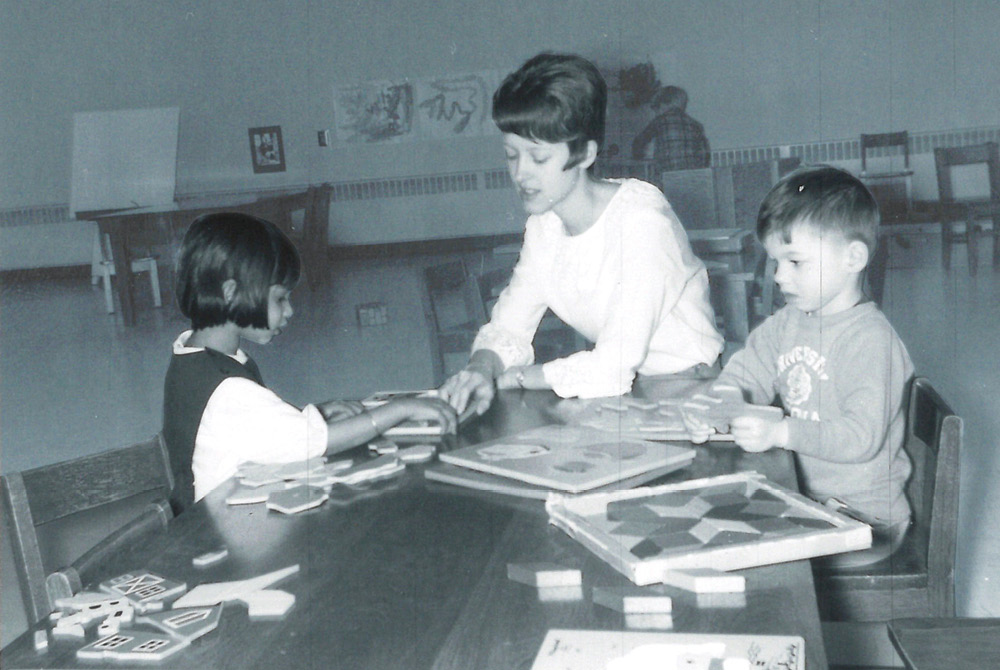Walking into a room as the only woman of color can feel like we are wearing pajamas at a black-tie event. It’s as if we accidentally stepped on a stage in the middle of a ballet performance. It feels as though the room itself was not made for us. Yet, we walk into these spaces anyway, each day.
We are not alone. Children are also aware that their identities are different and are not mirrored in their classrooms. They, like us, bring their cultural wealth, knowledge ingrained in family histories, and predispositions for learning as they enter classrooms. Through intentional efforts, we can integrate cultural wealth and family histories into the curriculum and create more inclusive and empowering learning environments that honor the diversity and strengths of all children. As the challenges and bans continue, we, as educators, are faced with the reality that our racial and ethnic identities are being erased, replaced, and white-washed and are removed from learning spaces. Instead of our cultural wealth being appreciated, we must hide parts of our identity, and avoid rooms where we feel we do not belong.
In our own experience as children from immigrant families, our names were frequently mispronounced or changed by teachers, erasing our identities. We endured ridicule for the shape of our eyes, our skin color, the languages we spoke at home, and our accents. We were made to feel both hypervisible due to our differences and invisible because those differences were not represented in the classroom. There were no teachers who resembled us. No books or curriculum reflected our identities. We felt ashamed of our families and began to conceal aspects of our cultural identities. This is not neutral; it is violent and harmful for all of us. It took us years to reclaim our given names and embrace our heritage. What does this mean for our working lives and for children who also express their cultural and ethnic identities in white spaces? As higher education professionals and teacher educators, what once caused us embarrassment, now compels us to cultivate pride and joy in our students by sharing our personal stories.
We advance justice through teaching. We believe that our actions and words inside college classrooms have the potential to change educational systems and the people who work within them. We start each quarter with enthusiasm and energy to invite, encourage, and challenge our students to be not only teachers but advocates and activists. We tell our students that they do not get to be neutral. They have a responsibility and opportunity to advance justice by creating equitable learning environments for their future and current students, and by changing the systems to be more just. We model those spaces through our practices and pedagogy, demonstrating to students that education can and should be a humanizing, caring, and brave space that centers their diverse identities and experiences.
As educators of color, we relentlessly work to inspire our students through our innovation, our hard work, and our care for them. We fight endless resistance and are constantly vigilant because we are viewed as “too radical” for our white-dominated field. From microaggressions to hard-stop no’s, we are told over and over again that our visions, our thoughts, and our actions are unrealistic, too challenging, and not the way things are done here. How can we disrupt and tear down racist systems for our collective children if we, the adults, are not willing or able to dismantle our own biases, relationships, and the institutions that we uphold?
We share our experiences to illuminate the racialized dynamics in the field of early childhood education. We do not ever get to be neutral because of our unwavering commitment to social justice, which begins with our willingness to be vulnerable and speak out. We hope that in revealing our painful truths, you will be inspired to speak up, stand with us, and do better. Our children depend on it.
Scenario 1:
In conversation with a white leader in the field of anti-bias early childhood education, we pointed out the disparity of the field with mostly white leadership and people of color providing caretaking in early learning. We asked what it would take for white leaders to recognize their privilege and move aside. This question evoked a defensive response as she referenced the socioeconomic challenges of white people in the early childhood education field, drawing a parallel between this and the racial oppression experienced by people of color in early childhood settings.
Impact: If white leaders say they are committed to racial equity and social justice, why do they fail to recognize their own racial privilege? I left that meeting angry and disappointed. I felt put in my place as if I were asking a ridiculous questions, as if I were the one that didn’t understand the meaning of privilege and justice. I am still left with the lingering question, what will it take? We spent days dissecting this moment. Was this question offensive? Why was she so uncomfortable? Why are diverse voices threatening? As we debated these questions, we asked the leader for a follow-up meeting.
Strategy: We always follow up. We claim our power and privilege to be able to speak up when white folks have it wrong, and when their thinking is not aligned with visions of social justice. We recognize that this labor is difficult for people of color, and it’s unfair, but in service to a vision of equity, we don’t let white folks stay in their comfort zone. We have conversations that we hope will push them to realize when they were wrong, caused harm, and need to do better.
Acknowledging and elevating the work of BIPOC women who dominate the labor-intensive roles in early childhood education, does not discount the work of white men and women in the field. Caring for the lives of Black and Brown people does not mean we do not care about white folks.
However, it has long been the case that white folks assume the majority of leadership roles, and are overrepresented in the K-12 public school system. This disparity is part of a long history of devaluing Black and Brown women’s labor, and our early childhood system continues to perpetuate these inequalities.
Black and Brown educators continue to work in this field and make up most of the new programs and hirings. Yet we are not given the same access to opportunities for higher pay, education, and leadership roles as our white colleagues. As social justice advocates, we must challenge this status quo. To leverage our privilege means knowing when it is time to move back to allow qualified BIPOC leaders to step forward. This is a personal choice and can be difficult in many circumstances, particularly as the system puts child care workers in an untenable financial situation, relying on additional jobs and sources of aid to support their own families. White child care professionals may not have economic privilege, but they do hold racial privilege, which can be spent to advocate for BIPOC advancement and compensation.
ADVERTISEMENT
Scenario 2:
During a recent national early childhood education conference, leaders from across the country were invited to share their opinions about proposed changes focusing on association membership costs. The focus of the conversation centered on how to increase revenue by raising membership fees. When a white male leader invited input from attendees, he attentively considered suggestions offered by white participants. However, when the few women of color expressed concerns about taxing other women of color in the early childhood field who make less than minimum wage, their concerns were dismissed with arguments about convincing folks in our field of the “value.” Our suggestions that membership should be provided free of charge as a service to folks in our field, were immediately rejected as impractical. Additionally, proposals advocating for conferences to accommodate the linguistic needs of early childhood professionals were deemed too costly.
Impact: We left humiliated, angry, and defeated. It is with courage that we speak up for ourselves and other women of color who are farthest from justice. As Asian American women we don’t fit the stereotype perpetuated by the model minority myth—we are not timid, quiet, obedient. We speak up because we recognize our privilege in doing so. At this moment, we felt robbed of our expertise and could feel the racialized and gendered microaggressions directed at us. Microaggressions are not micro, they are felt in every fiber of our being. They reverberate for days and months, even years; they are wounds that are reopened over and over again. Why invite us to the table, ask our opinion, and then dismiss our suggestions?
Strategy: Of course, we followed up, and we called the leader in to recognize his privilege, and the way he dismissed us in this moment. Next, we brought this topic up in every space we were in. We talked to women of color about our concerns so they could voice their own. We spoke up in other spaces where leaders were present. We wrote comments in every survey. A year later, we found ourselves back in the same room, with the same question, and this time it was asked respectfully, and our voices were part of the conversation.
Some people in power are invested in keeping their privilege. They do not intend to use their decision-making power to radically change our inequitable systems. Those in leadership positions with salaries that double ours, rarely offer to cut from their budgets or expenditures, however, are quick to suggest that those who have the least bear the burden: our early childhood teachers and our students. Even those with the best intentions may uphold white supremacy in ways that diminish the voices of historically marginalized and resilient peoples. There will be a financial cost to supporting people of color. You must literally spend your privilege toward scholarships and awards that lower the barrier to access. Do not rely on people of color to do the labor of teaching, correcting, and creating solutions; instead, we ask white leaders to carry and pave the way for change.
It’s not enough to give us a seat at the table, we need you to listen. Our words are intentional; they are hard-fought and won. We don’t take up space lightly, we speak when we have important things to say and we stand by our words, willing to do the work to make it happen. Do your part by helping transform our words into action. Share gratitude and credit for those ideas. Compensate folks when they contribute.
Scenario 3:
As part of a leadership team, we introduced innovative strategies to recruit, retain, and support folks of color in early childhood. In multiple situations, a white leader challenged our work by assigning us additional tasks such as requesting budgetary charts, calendar notifications, and more communication. She treated us like her personal secretaries and then blamed us for her ignorance. We also found ourselves to be the topic of discussion behind closed doors. When we discussed this with the leader, she apologized and said it wasn’t her intention.
Impact: It is deeply painful to be expected to be exceptional in leading Diversity, Equity, Inclusion (DEI) efforts and be constantly undermined, challenged, and asked to do trivial tasks. It was devastating to be attacked for white leaders’ personal insecurities, guilt, or failings. We are so tired of “I’m sorry”. It lacks accountability. These words do nothing to comfort our pain, assuage our fears, or change the circumstances that allow bad behavior to happen. We often cry about situations like these for days. How can white leaders take responsibility for their work in racial justice and recognize the harm they cause?
Strategies: We don’t need your apologies, your embarrassment, your good intentions, or excuses. We need you to take responsibility. Learn something and make a change that shows us you are capable of being better. Feel the discomfort and recognize that it is 100 times more painful for us. You are not the first or last one to judge us, diminish us, or hurt us. It is not good intentions, but privilege that allows you to abuse us and still keep your job, forget what happened, and not think about it again. These situations are not interpersonal disputes. The solution cannot only focus on repairing professional relationships. We must interrogate the culture and environment that allow them to persist and be perceived as one-time mistakes.
Leaders need to grapple with whiteness, including their power hoarding, their belief in one right way, and their either/or thinking. Their individual decisions have the power to uphold or disrupt our educational systems, and thus, leaders need to make space and shift power to BIPOC educators. It is not enough to recruit people of color; you must do the work of transforming spaces to retain us.
Our field moves too slowly to urgent calls for action. Education cannot continue to exist as it does now, pushing Black and Brown children out of schools into other systems like the carceral state and blaming students and their families for not rising to artificial standards. We, all those who uphold our current educational system, whether through our silence and complicity or our slow actions, are letting our privilege prevent transformative change. So if you aren’t willing to spend your privilege, please move aside.
For those of you who read this and resonate with our words, we encourage you to find each other, folks who understand the struggle, and who are committed to whatever it takes. It helps to have each other to complain, work through, and cry together in these moments. We need each other for support because this work is not easy; it is exhausting. Our communities lift us up when we feel burnt out, exhausted, and demoralized, so that we can continue to dream and hope for a just future.
Keep reminders all around you. Our desks are filled with affirmations; “You are a badass.” “She believed she could, so she did.” “Live as if your life were a book banned in Florida.” We wear t-shirts with messages that remind us of our power and privilege. We wear bracelets that say “Courage” and “Live your Truth.” And if that’s not enough, hear us loud and clear: You are brilliant. You are deserving of respect and admiration. You are not alone. We are not alone.
We do not get to be neutral, and we do not want to be neutral. We deserve and our children deserve to be free in this world, and we will persist until we have an educational system that is liberatory. So we ask ourselves, and each other, what will it take? And will you walk with us into those unwelcome spaces and join us in advocating for justice?
Related
ADVERTISEMENT












